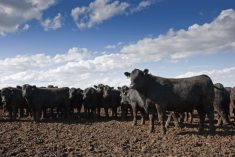For the week ending June 7, Western Canadian feeder cattle markets traded steady to as much as $15/cwt higher in some cases. Larger packages of quality replacements over 900 pounds were up $10-$15/cwt from prices seven days earlier.
The market has recovered after the softer tone earlier in June. Strength in the heavier weight categories was largely due to the surge in the U.S. fed cattle market. On Wednesday, Alberta packers were buying fed cattle in Southern Alberta at $298/cwt fob feedlot. However, on Thursday, Texas live prices were reported at US$232/cwt fob feedlot, up US$10/cwt from the previous week.
Read Also

U.S. grains: Soy hits 17-month high, corn to four-month top as trade braces for U.S. data
Chicago Board of Trade soybean futures rose on Thursday to their highest in nearly 17 months as traders awaited a U.S. government crop report that was expected to lower yield estimates, while also bracing for the resumption of export data to give clues on Chinese buying.
Live prices in Nebraska reached up to US$240/cwt. In Canadian dollars, this equates to Cd$317/cwt fob feedlot in Texas and Cd$329/cwt in Nebraska. Ideas were that the Alberta packers would have to increase bids for local cattle to compete with U.S. packers.
North of Saskatoon, a larger package of mixed medium frame backgrounded steers with full preconditioning weighing 1,000 pounds sold for $402/cwt fob farm. At the Ponoka sale, larger frame, thin, tan heifers weighing 957 pounds on silage diet with no grain over the past month with full processing records traded for $380/cwt. At the Westlock sale, black and red Simmental steers weighing 946 pounds on barley and silage diet with full health records on the card at 946 pounds were last bid at $399/cwt.
North of Calgary, larger frame Angus cross steers on silage and light grain ration weighing just over 800 pounds were valued at $$465/cwt fob farm. In southern Alberta, larger frame mixed heifers averaging 810 pounds reportedly sold for $410/cwt fob farm.
In the Lethbridge area, a smaller package of black steers weighing 777 pounds traded for $479/cwt and 725-pound black steers dropped the gavel at $522/cwt. At the Westlock sale, Limousine cross heifers with a mean weight of 736 pounds coming off a diet of oats, hay and mineral supplement with full herd health data traded for $435/cwt.
The Ste Rose Auction market report had tan steers weighing 647 pounds trading for $550/cwt and red steers scaled at 590 pounds selling for $577/cwt. At the Ponoka sale, a smaller package of tan, weaned heifers scaled at 597 pounds apparently dropped the gavel at $527.
At the Beaverlodge sale, a handful of black heifers weighing 513 pounds reportedly moved through the ring at $552/cwt. Southeast of Calgary, mixed steers weighing 500-525 pounds were trading in the range from $605/cwt to as high as $640/cwt.
Canadian cattle producers have been benefiting from the U.S. tariffs on beef imports. Beef demand is inelastic and when tariffs are implemented on commodity with inelastic demand, the U.S. consumer pays the bulk of the tariff. U.S. wholesale and retail beef prices continue to trend higher.
It’s important to note that U.S. beef imports will subside in the fourth quarter of 2025. In October through December, ideas are that fed cattle prices will be at the current levels or higher. Keep in mind that the U.S. closed the border to Mexican feeder cattle on May 11 due to cases of New World screwworm. Trade projections suggest it will take three to four months for the U.S. border to reopen to Mexican feeders.















